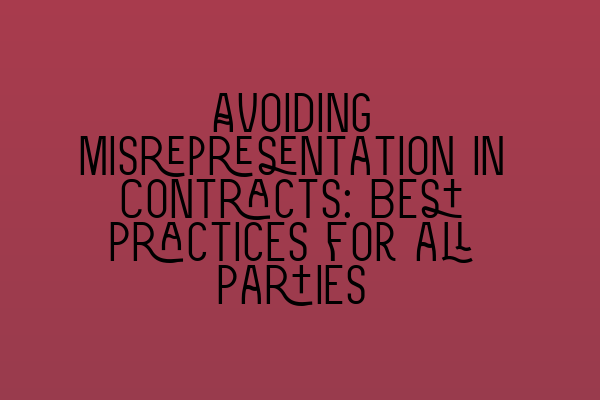Avoiding Misrepresentation in Contracts: Best Practices for all Parties
Contracts are the backbone of commercial relationships, ensuring that parties involved understand their rights and obligations. However, misrepresentation in contracts can lead to disputes, financial loss, and damage to business reputation. It is essential for all parties to be aware of the best practices for avoiding misrepresentation to ensure smooth transactions and enforceable agreements.
In this article, we will explore the key strategies for avoiding misrepresentation, from the perspectives of both solicitors and clients.
1. Understand the Elements of Misrepresentation
Before delving into best practices, it is crucial to have a clear understanding of what constitutes misrepresentation. Misrepresentation occurs when false statements or omissions are made during contract formation, inducing a party to enter into the agreement.
To fully grasp the concept, it is worthwhile to examine real-life case studies that highlight the legal implications and consequences of misrepresentation. Unveiling Real-Life Case Studies: Insights into Legal Practice and Decision-Making provides valuable insights into these scenarios, helping both solicitors and clients to make informed decisions.
2. Conduct Thorough Due Diligence
Prior to entering into a contract, it is crucial for all parties to conduct thorough due diligence, ensuring the accuracy and integrity of information provided. This includes verifying the identity and background of the other party and assessing their financial stability.
Solicitors play a pivotal role in this process by conducting comprehensive searches and gathering relevant information. Expanding your knowledge on due diligence techniques and staying up-to-date with the latest practices is essential. Learn more about the intricacies of due diligence by exploring Exploring Solicitor Salaries in the UK: Average Earnings and Factors Affecting Income.
3. Clearly Define Terms and Representations
One common cause of misrepresentation is ambiguous or incomplete contract language. To prevent misinterpretation, it is vital to clearly define the terms and representations within the contract. This includes specifying all relevant details, such as timeframes, deliverables, and performance expectations.
Solicitors should emphasize the importance of unambiguous contract drafting. By mastering this skill, you can enhance client relationships and build trust in your legal expertise. For guidance on improving your contract drafting skills, refer to Mastering Client Relationship Management: Skills for Solicitors to Enhance Trust and Loyalty.
4. Verify the Accuracy of Statements
Prior to relying on any statements made during contract negotiation, it is crucial to verify their accuracy. This verification process may involve conducting independent research, consulting experts, or seeking third-party opinions.
As a solicitor, it is your responsibility to guide clients on the importance of diligent verification and help them navigate this process. Understanding the road to becoming a solicitor and gaining practical experience through training contracts is crucial. Discover more about securing training contracts in our article on Securing Training Contracts: A Roadmap to Becoming a Solicitor.
5. Promote Open Communication
Open communication is key to avoiding misrepresentation in contracts. All parties should encourage transparency and disclose any material facts that may impact the agreement.
Solicitors can communicate the importance of open dialogue to clients, ensuring they fully understand their obligations to disclose accurate information. By doing so, you can help prevent potential disputes arising from misrepresentation.
6. Seek Professional Advice
If there is any uncertainty or complexity surrounding the contract terms, seeking professional advice is essential. Consulting with a solicitor who specializes in contract law can provide valuable insights and ensure all legal obligations are met.
If you are unsure about pursuing a law school education or require guidance on choosing the right path for your future, our article on Pursuing a Law School Education in the UK: Choosing the Right Path for Your Future can provide helpful information.
Conclusion
Avoiding misrepresentation in contracts requires a proactive and diligent approach from all parties involved. By understanding the elements of misrepresentation, conducting thorough due diligence, clearly defining terms, verifying accuracy, promoting open communication, and seeking professional advice when necessary, parties can mitigate the risks associated with misrepresentation.
Implementing these best practices will not only protect the interests of all parties but also foster stronger and more trustworthy business relationships.
